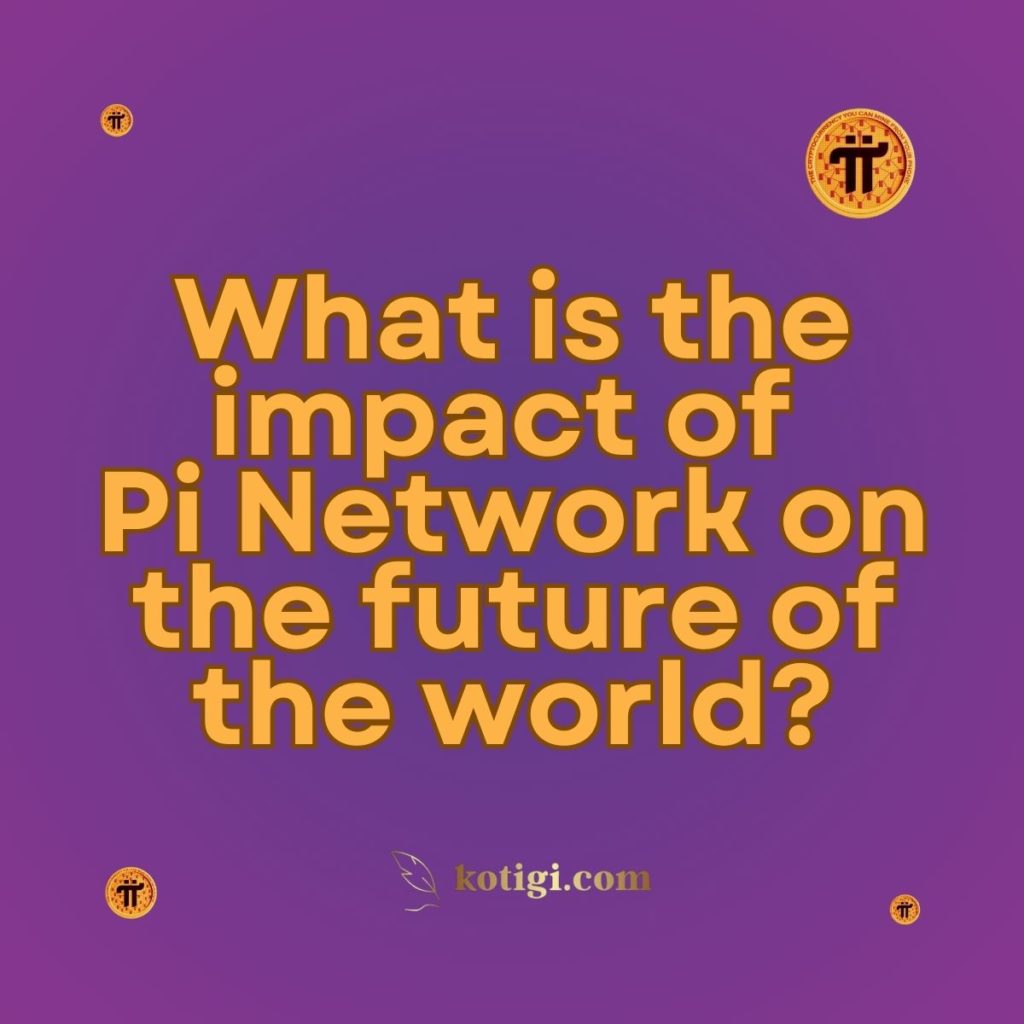
What is the impact of Pi Network on the future of the world?
The Pi Network is set to significantly impact the future of the world by enabling decentralized finance, fostering community engagement, and promoting sustainable development. This article explores how the Pi Network can transform various sectors, empower individuals, and contribute to a more equitable and connected global society.
Introduction
As we navigate the complexities of the 21st century, technological advancements continue to reshape our world, influencing how we interact, transact, and learn. The emergence of blockchain technology and decentralized platforms has the potential to revolutionize traditional systems, promoting transparency, security, and accessibility. Among these innovations, the Pi Network stands out as a decentralized digital currency platform that aims to empower individuals and communities worldwide. This article examines the various ways the Pi Network can impact the future of the world, focusing on its implications for decentralized finance, community engagement, and sustainable development.
Enabling Decentralized Finance
The Pi Network is positioned to play a crucial role in the evolution of decentralized finance (DeFi), transforming how individuals engage with financial systems.
Accessibility to Financial Services
One of the most significant impacts of the Pi Network is its ability to provide access to financial services for individuals who are unbanked or underbanked. Many people worldwide lack access to traditional banking systems, limiting their ability to save, invest, and transact. By leveraging the Pi Network, users can participate in a decentralized financial ecosystem that allows them to manage their assets, make transactions, and engage in financial activities without the need for intermediaries. This accessibility empowers individuals and promotes financial inclusion on a global scale.
Lower Transaction Costs
The Pi Network can help reduce transaction costs associated with traditional banking systems. By eliminating intermediaries and utilizing a decentralized platform, users can send and receive funds with minimal fees. This cost-effectiveness is particularly beneficial for individuals and businesses in developing countries, where high transaction fees can be a significant barrier to economic participation. Lower transaction costs can enhance the flow of money, stimulate economic growth, and foster entrepreneurship.
Empowering Peer-to-Peer Transactions
The Pi Network facilitates peer-to-peer transactions, enabling individuals to transact directly with one another without relying on centralized authorities. This direct interaction fosters a sense of trust and transparency, as users can engage in transactions based on mutual agreements. By empowering individuals to transact freely, the Pi Network enhances economic freedom and encourages the growth of local economies.
Fostering Community Engagement
The Pi Network’s emphasis on community building can have a profound impact on how individuals connect and collaborate within their communities.
Strengthening Local Economies
The Pi Network encourages users to engage in local economic activities by enabling peer-to-peer transactions and facilitating the exchange of goods and services within communities. This localized approach can stimulate economic growth and create opportunities for small businesses and entrepreneurs. As individuals transact with one another using Pi, they contribute to their local economies, fostering a sense of community and shared purpose.
Building Trust and Collaboration
By fostering a decentralized network, the Pi Network encourages trust and collaboration among its users. Participants can share knowledge, resources, and support, creating a community-driven environment where individuals work together towards common goals. This sense of collaboration enhances social bonds, promotes civic engagement, and empowers individuals to take an active role in shaping their communities.
Encouraging Social Initiatives
The Pi Network can serve as a platform for users to launch and support social initiatives, from educational programs to community development projects. By leveraging the network’s resources and connections, individuals can collaborate on initiatives that address local challenges and promote positive change. This focus on social impact can lead to more engaged and empowered communities that actively work towards improving their circumstances.
Promoting Sustainable Development
The Pi Network has the potential to contribute to sustainable development efforts by fostering environmentally conscious practices and encouraging responsible resource management.
Supporting Green Initiatives
The Pi Network can promote sustainability by supporting green initiatives and environmentally friendly practices. Users can engage in transactions that prioritize eco-friendly products and services, fostering a marketplace that values sustainability. Additionally, the network can facilitate collaborations between individuals and organizations focused on environmental conservation, enabling users to participate in projects that protect natural resources.
Encouraging Responsible Consumption
Through the Pi Network, users can access information about sustainable products and services, empowering them to make informed choices about their consumption habits. By promoting responsible consumption, the network encourages individuals to consider the environmental impact of their purchasing decisions, leading to more sustainable lifestyles and practices.
Enhancing Transparency in Supply Chains
The Pi Network’s decentralized nature can enhance transparency in supply chains, allowing users to track the origin and journey of products. This transparency promotes ethical sourcing, fair trade practices, and accountability among businesses. By supporting transparent supply chains, the Pi Network contributes to a more sustainable and responsible global economy.
Transforming Education and Skill Development
The Pi Network can significantly impact the future of education and skill development, shaping how individuals learn and acquire new competencies.
Access to Educational Resources
The Pi Network can democratize access to educational resources, enabling individuals from diverse backgrounds to engage in continuous learning. By providing a platform for online courses, workshops, and collaborative learning opportunities, the network enhances educational accessibility and empowers users to pursue their learning goals.
Promoting Lifelong Learning
The culture fostered by the Pi Network encourages lifelong learning, emphasizing the importance of ongoing skill development. Users are motivated to continuously enhance their knowledge and capabilities, ensuring they remain competitive in the evolving job market. This commitment to lifelong learning contributes to personal and professional growth, ultimately benefiting society as a whole.
Facilitating Knowledge Sharing
The Pi Network encourages users to share their expertise and knowledge with one another, fostering a collaborative learning environment. This peer-to-peer learning approach enables individuals to learn from diverse perspectives, enhancing their understanding of various topics. By promoting knowledge sharing, the network creates a culture of learning that benefits all participants.
Shaping a More Equitable Future
The Pi Network has the potential to contribute to a more equitable and connected world by empowering individuals and fostering inclusivity.
Reducing Economic Inequality
By providing access to financial services and educational resources, the Pi Network can help reduce economic inequality. Individuals who were previously excluded from traditional systems can participate in the digital economy, gain access to opportunities, and improve their living standards. This shift promotes economic empowerment and helps bridge the gap between different socio-economic groups.
Empowering Marginalized Communities
The Pi Network can serve as a platform for marginalized communities to amplify their voices and engage in economic activities. By providing tools for financial inclusion and community building, the network empowers individuals to take control of their circumstances and work towards improving their communities. This empowerment fosters social cohesion and encourages collective action for positive change.
Creating Global Connections
The decentralized nature of the Pi Network fosters connections between individuals and communities worldwide. By enabling cross-border transactions and collaborations, the network creates a global community of users who can share ideas, resources, and experiences. This interconnectedness promotes cultural exchange, understanding, and cooperation, contributing to a more harmonious and unified world.
Conclusion
The Pi Network is poised to have a profound impact on the future of the world by enabling decentralized finance, fostering community engagement, promoting sustainable development, transforming education, and shaping a more equitable future. By empowering individuals and communities, the Pi Network contributes to a more connected, inclusive, and prosperous global society. As the world continues to evolve, the Pi Network will play a crucial role in driving positive change and facilitating the emergence of new opportunities for individuals worldwide.
Key Takeaways
- Enabling Decentralized Finance: The Pi Network provides access to financial services, lowers transaction costs, and empowers peer-to-peer transactions, promoting financial inclusion.
- Fostering Community Engagement: The network strengthens local economies, builds trust, and encourages social initiatives, enhancing community bonds and collaboration.
- Promoting Sustainable Development: By supporting green initiatives and responsible consumption, the Pi Network contributes to environmentally conscious practices and enhances transparency in supply chains.
- Transforming Education and Skill Development: The network democratizes access to educational resources, promotes lifelong learning, and facilitates knowledge sharing among users.
- Shaping a More Equitable Future: The Pi Network helps reduce economic inequality, empowers marginalized communities, and creates global connections, contributing to a more inclusive and harmonious world.




